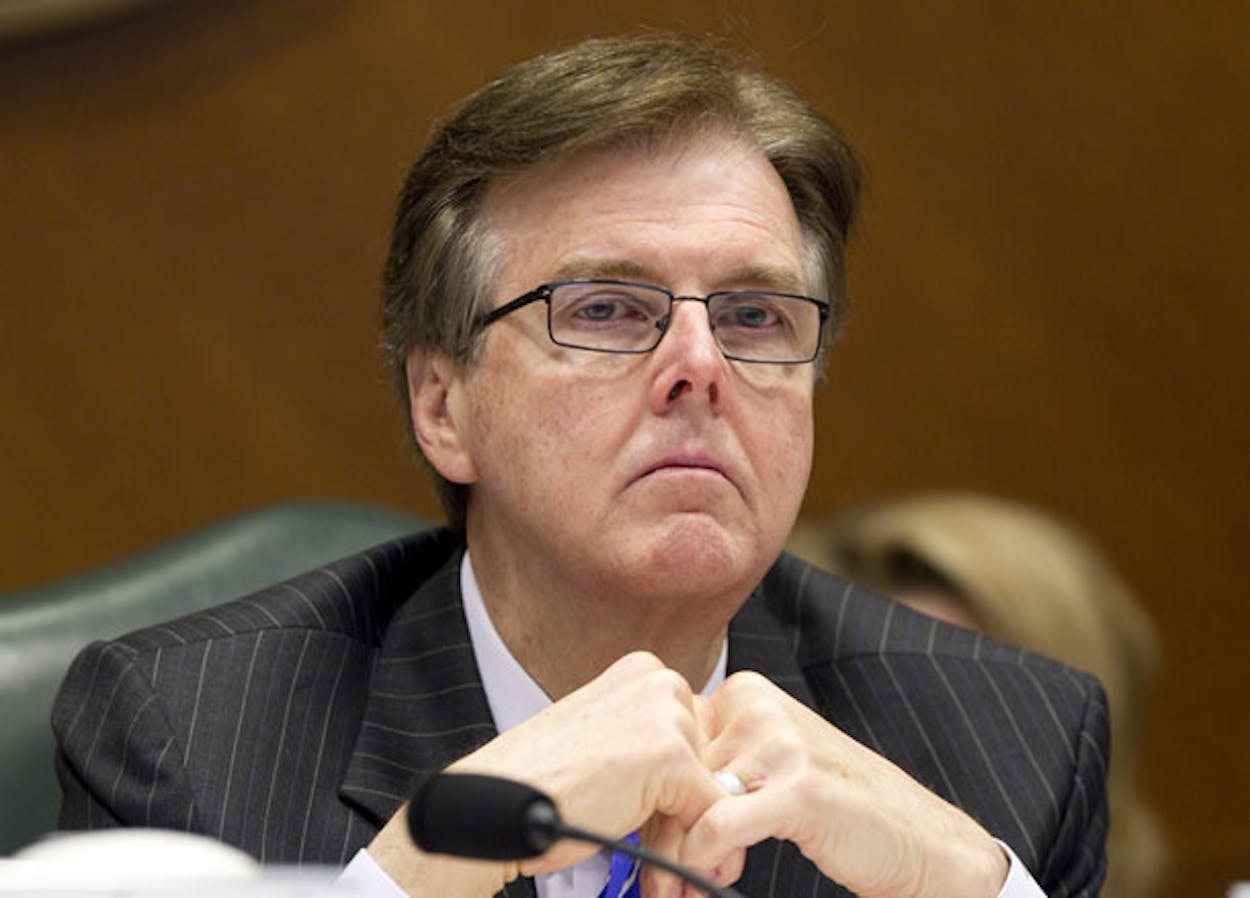On Tuesday afternoon the Senate Education Committee heard testimony on a bill that would grant the State Board of Education oversight of CSCOPE, an online curriculum delivery system that has drawn the ire of conservative activists for its alleged “progressive, pro-Islam bias.”
Four hours later, almost everyone had been frustrated. “It appears to me that many of the people who are defending [CSCOPE] are defending it regardless of the information provided,” said Dan Patrick, a Republican state senator from Houston. “It’s almost as if nothing that is shown or said will change their minds.”
The CSCOPE system, which was developed by a consortium of state-funded education service centers, is used by some 875 school districts in Texas. Teachers can log on and download a variety of lesson plans—created by educators from around the state—on a full spectrum of subjects, including social studies and science, which incorporate the Texas Essential Knowledge and Skills (TEKS). It first gained national attention last November when conservative talk show host (and recent Dallas transplant) Glenn Beck mentioned a lesson on his show that said that, from the British perspective, the Boston Tea Party could be considered an act of terrorism.
Patrick, who chairs the Senate Education Committee, had explained that he drafted SB 1406 because of his “great concerns about the management, the supervision, and the oversight” of the system. Proponents of the bill who testified shared those concerns; some complained that another lesson on Islam said that “Allah” was another word for “God.” Others complained that material in the lesson plans was not always appropriate for grade level.
Notably, some of the SBOE members themselves took a tempered view. First up was Barbara Cargill, the chair of the board, who explained that after a January hearing in Patrick’s committee she had convened an ad hoc committee made up of four SBOE board members and three CSCOPE directors to review materials and correct any errors found.
Patrick was dissatisfied with that approach; per his bill, he would rather have the SBOE “maintain oversight and direction” of CSCOPE, which would mean the state board must sign off on the program’s lesson plans. Another acceptable outcome for Patrick, he said, would be for CSCOPE to get out of the business of producing lesson plans entirely and return to being simply a curriculum management tool.
Panel after panel of superintendents—most from small rural districts, which are not known to be a hotbed of progressive radicalism—testified against Patrick’s bill. Many were upset that the measure could impede local control of their lesson plans, and argued that the state board, which sets the curriculum standards for the Texas Essential Knowledge and Skills (TEKS), has sufficient oversight already.
“CSCOPE is a Texas product created by Texas educators for Texas kids to prepare for Texas testing,” said Kevin Stanford, superintendent of Kerens ISD, a rural district in East Texas with 657 students. “It’s not perfect, but it can be corrected and, as noted by Ms. Cargill, it can be corrected quickly.” Stanford said he worried about adding another layer of bureaucracy to the process.
“Do you understand the reason for our bill is to—like [with] textbooks—have oversight?” Patrick asked, leading into his question the same (rather condescending) way he has all session towards witnesses opposed to his bills. Patrick insisted this added scrutiny would eliminate errors.
“Every textbook that I’ve ever been associated with has had a mistake,” Stanford said.
“At least with textbooks the State Board of Education is there to whittle down those mistakes,” Patrick retorted.
Robert Duncan, a Republican senator from Lubbock, cautioned that having the SBOE move into the business of reviewing curriculum down to the level of lesson plans could be costly. “If you’re going to do this, the road’s going to be rocky,” he said. “You’re going to have to staff up the state board.” Instead, Duncan advocated sticking with the model offered by Cargill. He said he feared that Patrick’s proposed model could “set up some situation when eventually the state will take over this role of curriculum development and take it away from the schools and the teachers.”
Patrick found more support from Sen. Donna Campbell, R-New Braunfels, who said she agreed with parents’ complaints that they should be able to access all of CSCOPE’s lesson plans for review. “CSCOPE was shrouded in secrecy. We need transparency,” she said.
That last point was one with which Thomas Ratliff, a SBOE member, could agree. “Much of this has been blown out of proportion,” Ratliff told the committee. “Many of the problems can be solved with transparency.”
But unlike Campbell, Ratliff thought Patrick’s bill was no panacea. “I believe that transparency works,” he said. “But four days after the state board has its first meeting on this here we are talking about more regulations. Let transparency work.”
- More About:
- Politics & Policy







